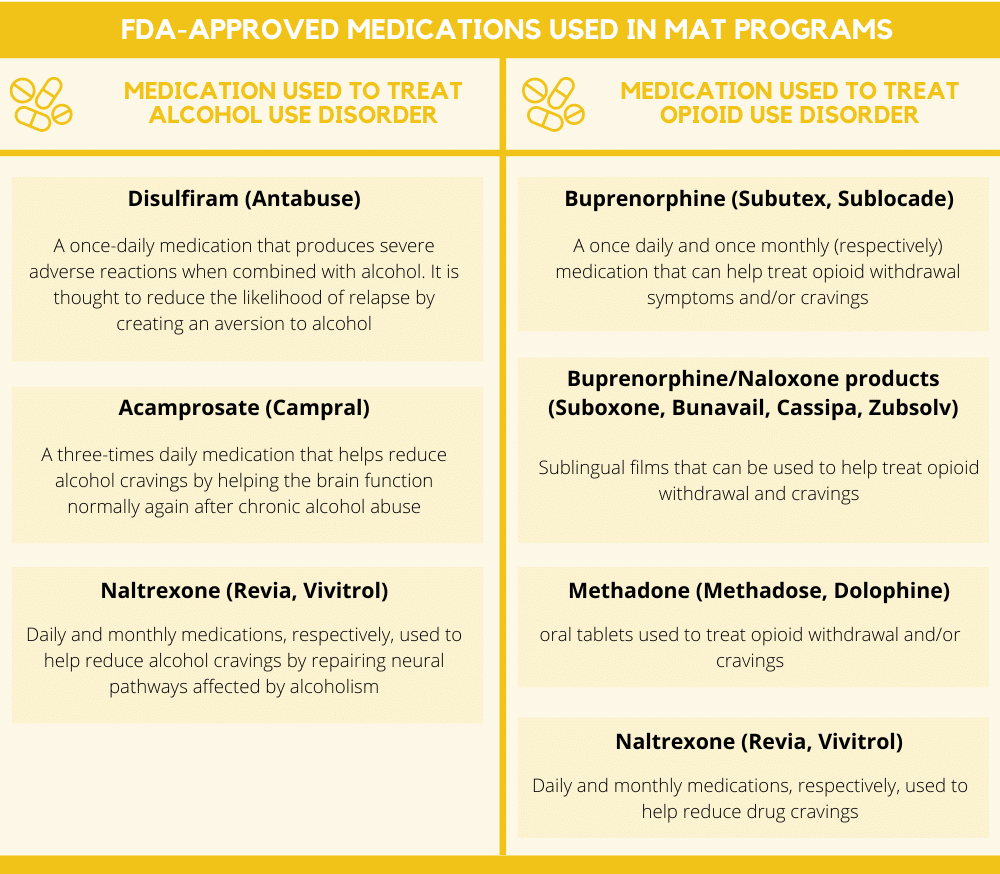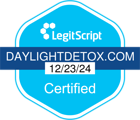Alcohol is the most widely used addictive substance in the world, and the United States continues to face an opioid overdose crisis.[1] These substances cost thousands of people their lives each and every year, and, unfortunately, they are both extremely difficult to quit. Today, the gold standard for treating both alcohol and opioid use disorders is medication-assisted treatment (MAT). MAT involves the use of medications and behavioral therapy to help patients overcome their addictions to alcohol and/or opioids.
What is Medication-Assisted Treatment (MAT)?
Medication-Assisted Treatment (MAT), as defined by SAMHSA, “is the use of medications, in combination with counseling and behavioral therapies, to provide a “whole-patient” approach to the treatment of substance use disorders.” SAMHSA goes on to explain that all medications used in MAT are approved by the U.S. Food and Drug Administration (FDA) and MAT programs and therapies are clinically tailored to meet each patient’s unique needs.[2]
While traditional addiction treatment programs focus primarily on counseling and peer support groups, MAT adds an extra element into treatment: medication. There is extensive research available that proves combining therapy and medication can successfully treat some addictions and prevent poor treatment outcomes.
FDA-Approved Medications Used in MAT Programs
The FDA has approved many different medications to help treat opioid use disorder and alcohol use disorder. Each medication is different in the way they work, but all medications have the ultimate goal of helping promote complete recovery. The medications used are not meant to simply substitute one substance with another; they are evidence-based treatment options for addiction.

Medications that are used to treat alcohol use disorder (AUD) include:[3]
- Disulfiram (Antabuse) – A once-daily medication that produces severe adverse reactions when combined with alcohol. It is thought to reduce the likelihood of relapse by creating an aversion to alcohol
- Acamprosate (Campral) – A three-times daily medication that helps reduce alcohol cravings by helping the brain function normally again after chronic alcohol abuse
- Naltrexone (Revia, Vivitrol) – Daily and monthly medications, respectively, used to help reduce alcohol cravings by repairing neural pathways affected by alcoholism
Medications that are used to treat opioid use disorder (OUD) include:[4]
- Buprenorphine (Subutex, Sublocade) – A once daily and once monthly (respectively) medication that can help treat opioid withdrawal symptoms and/or cravings
- Buprenorphine/Naloxone products (Suboxone, Bunavail, Cassipa, Zubsolv) – Sublingual films that can be used to help treat opioid withdrawal and cravings
- Methadone (Methadose, Dolophine) – oral tablets used to treat opioid withdrawal and/or cravings
- Naltrexone (Revia, Vivitrol) – Daily and monthly medications, respectively, used to help reduce drug cravings
Each of these medications is most effective when combined with an individually-tailored treatment program involving behavioral therapy and peer support.
Behavioral Therapy and Counseling
Medication is not intended to serve as a substitute for therapy or an addiction treatment program. Instead, medications are used to complement a full-service treatment program to improve a patient’s chances of success.
Every person who comes to rehab is different with unique needs, which is why no two treatment plans look exactly the same. Some therapies patients may participate in during MAT in West Palm Beach include:
- Cognitive-behavioral therapy (CBT)
- Dialectical behavior therapy (DBT)
- Motivational interviewing (MI)
- Contingency management (CM)
- Family therapy
- Neurofeedback/Biofeedback
- Holistic therapies (art, yoga, nutrition, exercise, etc.)
- Rational Emotive Behavior Therapy (REBT)
- Trauma and PTSD therapy
- 12-Step Facilitation
Throughout treatment, patients are encouraged to develop a sober support system and participate in local 12-Step or recovery-based meetings. They also check in with their doctor and therapist on a regular basis to discuss medication adherence, side effects, and progress in treatment.
Positive Outcomes Associated With Medication-Assisted Treatment (MAT)
MAT medications help reduce drug and alcohol withdrawal symptoms as well as cravings. This allows patients to focus fully on therapy and their individual recovery. By providing a more comprehensive and individually-tailored treatment approach, MAT can help patients build the foundation for a self-directed life. A few of the clinically-proven benefits of a medication-assisted treatment approach include:[2]
- Improved rates of patient survival after rehab
- Increased patient retention in rehab
- Lower rates of illicit opioid use after treatment
- Decrease in criminal activity among those with substance use disorder
- Improved patient ability to gain and maintain employment
- Improved birth outcomes in babies who are born to mothers who are addicted to opioids
- Lowering the risk of contracting HIV, Hepatitis C, and other blood-borne illnesses
- Reduced risk for relapse
MAT medications, when used correctly and in-tandem with a comprehensive treatment program, can provide patients with fantastic treatment outcomes.
Find Out if Medication-Assisted Treatment in West Palm Beach is Right For You
People who are addicted to alcohol and/or opioids may be good candidates for medication-assisted treatment, but MAT isn’t right for everyone. Here at Daylight Recovery Center, our team of trusted addiction specialists is standing by to help you figure out what kind of treatment program is right for you. Call now for a risk-free consultation and find out if MAT in West Palm Beach is right for you.
References:



